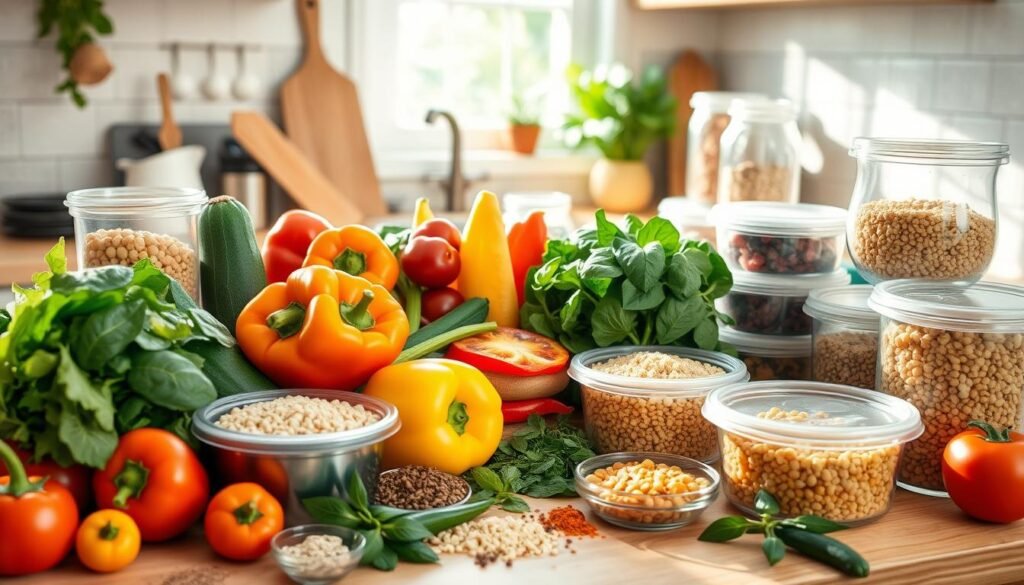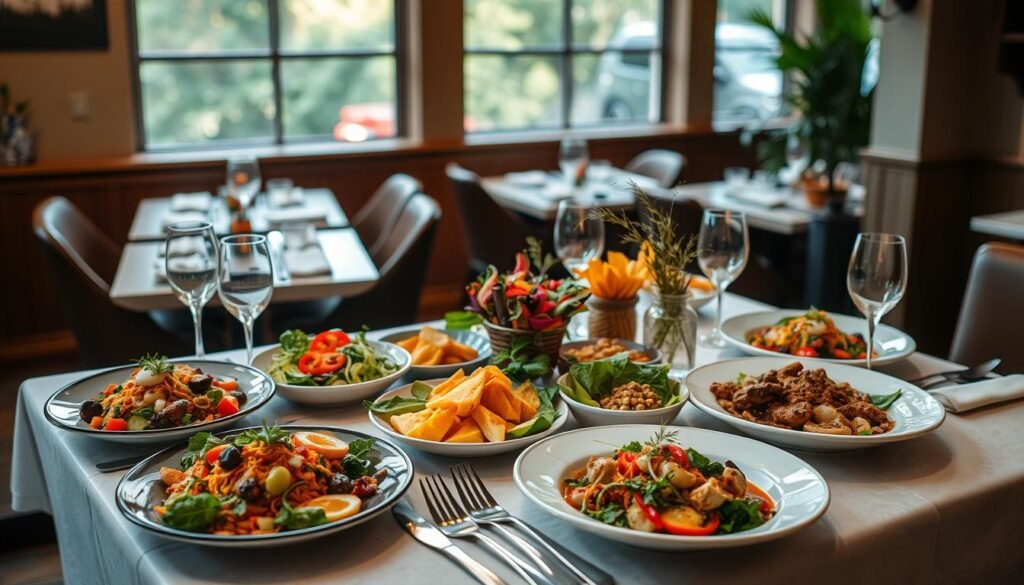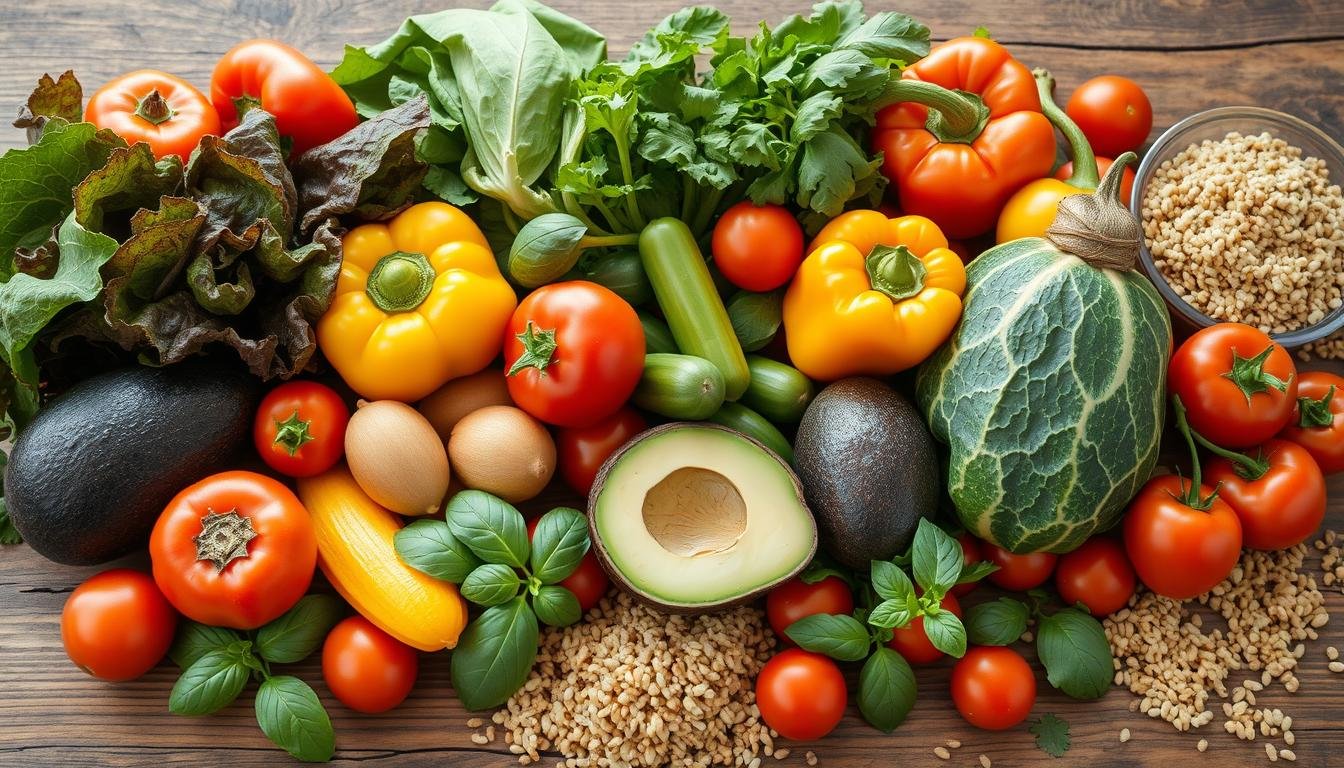Ready to start a healthy plant-based lifestyle? This 7-day vegetarian diet plan is here to help. It’s filled with nutritious recipes and wholesome plant foods. It makes switching to a meatless diet easy and tasty.
Vegetarian diets focus on fruits, vegetables, whole grains, legumes, and nuts. They can lower one’s risk of heart disease, diabetes, and some cancers. A 2021 study in the International Journal of Environmental Research and Public Health showed that vegetarian diets fight chronic inflammation.
This 7-day meal plan is based on a 2,000-calorie diet. It shows how varied and flavorful plant-based food can be. You’ll get enough protein, carbs, fiber, and healthy fats to keep you going all day.
Start a tasty and healthy vegetarian journey with this guide. You’ll find recipes like Roasted Sweet Potato Salad and Portobello Bruschetta. Plus, there are tips for meal prep and using leftovers to make your diet easier.
Key Takeaways:
- A well-planned vegetarian diet can reduce the risk of chronic diseases like heart disease, diabetes, and certain cancers.
- This 7-day vegetarian meal plan provides a balanced mix of protein, carbohydrates, fibre, and healthy fats.
- Daily calorie totals range from 1,978 to 2,006 calories, with ample nutrients to support an active lifestyle.
- Enjoy delicious recipes like Roasted Sweet Potato Salad, Portobello Bruschetta, and Tasty Lentil Tacos.
- Helpful tips for meal prep and using leftovers make following a vegetarian diet easy and enjoyable.
Benefits of a Vegetarian Diet
Choosing a vegetarian diet can have many health benefits. It’s a great option for those who want to feel better. Eating nutritious vegetarian meals and healthy vegetarian food can help you see positive changes in your body and mind.
Reduced Risk of Chronic Diseases
A balanced veggie diet can lower your risk of chronic diseases. A 2023 review in Nutrients found that plant-based diets are linked to less heart disease, cancer, and diabetes. The American Cancer Society also says that foods high in fiber, found in vegetarian diets, can lower cancer risk, especially colorectal cancer.
Improved Digestive Health
Vegetarian diets can also improve your digestive health. Plant-based foods are high in fiber, which helps with regular bowel movements and supports good gut bacteria. This can help prevent digestive problems like constipation and inflammatory bowel disease.
Weight Management
For weight management, a balanced diet with vegan options is very helpful. A vegetarian diet with foods rich in protein, fiber, fruits, vegetables, and healthy fats can help you lose 1 to 2 pounds a week. There are vegetarian meal plans available at 1,200 calories a day, showing how to eat balanced for weight loss.
| Nutrient | Daily Total |
|---|---|
| Protein | 50 grams |
| Carbohydrates | 135 grams |
| Fiber | 30 grams |
| Fat | 40 grams |
| Sodium | 1,500 milligrams |
Remember, everyone’s nutritional needs are different. Meal plans are meant to inspire and can be tailored to fit your needs.
Essential Nutrients for Vegetarians
It is key for vegetarians to get all the nutrients their bodies need. A plant-based diet is rich in nutrients, but watch out for some missing from animal products. Focus on plant-based nutrition and eat a variety of vegetarian protein foods to keep your diet balanced and healthy.
Protein
Protein is vital for building and repairing tissues. It’s also important for many body functions. While animal products are known for protein, plants offer great options too. Some top vegetarian protein foods are:
- Legumes (beans, lentils, peas)
- Tofu and tempeh
- Nuts and seeds
- Whole grains (quinoa, oats, brown rice)
Eating a variety of protein sources throughout the day is key to getting all essential amino acids.
Iron
Iron is needed for making hemoglobin, which carries oxygen. While animal iron is more easily absorbed, plants have non-heme iron too. Good plant-based iron sources include:
- Dark leafy greens (spinach, kale, Swiss chard)
- Legumes (beans, lentils, peas)
- Fortified cereals and bread
- Dried fruit (apricots, raisins, prunes)
Eat these foods along with vitamin C-rich foods like citrus fruits, berries, and bell peppers to boost iron absorption.
Vitamin B12
Vitamin B12 is crucial for nerve function and red blood cell production. Since it’s mainly in animal products, vegetarians need to pay extra attention. Good sources include:
- Fortified plant-based milks (almond, soy, coconut)
- Fortified cereals and nutritional yeast
- Eggs and dairy products (if included in your vegetarian diet)
If you can’t get enough B12 from food, talk to your doctor about supplements.
Calcium
Calcium is essential for strong bones and teeth. It also helps with muscle and nerve functions. While dairy is a top calcium source, plants have options too. Some great sources are:
- Dark leafy greens (collard greens, kale, bok choy)
- Fortified plant-based milks and yogurts
- Tofu (made with calcium sulfate)
- Beans and lentils
| Nutrient | Recommended Daily Intake | Top Vegetarian Sources |
|---|---|---|
| Protein | 0.8 grams per kg of body weight | Legumes, tofu, nuts, seeds, whole grains |
| Iron | 18 mg (women), 8 mg (men) | Dark leafy greens, legumes, fortified cereals, dried fruit |
| Vitamin B12 | 2.4 mcg | Fortified plant-based milks, fortified cereals, nutritional yeast, eggs, dairy |
| Calcium | 1,000-1,200 mg | Dark leafy greens, fortified plant-based milks and yogurts, tofu, beans |
By focusing on these nutrients and eating a wide variety of plant-based nutrition, you can make sure your vegetarian eating plan is both tasty and balanced.
Preparing for Your 7-Day Vegetarian Diet Plan
Starting a vegetarian meal-prep journey is exciting and rewarding. Planning ahead and having a stocked kitchen set you up for success. Let’s explore the key steps for your seven-day vegetarian diet plan.
Grocery Shopping List
Before starting your vegetarian diet, make a detailed grocery list. Here are some essential items:
- Fresh fruits and vegetables
- Whole grains (quinoa, brown rice, whole-wheat pasta)
- Legumes (lentils, chickpeas, black beans)
- Nuts and seeds (almonds, chia seeds, pumpkin seeds)
- Dairy alternatives (almond milk, coconut yogurt)
- Tofu and tempeh
- Herbs and spices

Meal Planning Tips
Here are some tips to make your vegetarian meal prep easy:
- Plan your meals in advance to ensure you have all the necessary ingredients.
- Batch cook grains, legumes, and roasted vegetables to save time during the week.
- Prepare mason jar salads or bento boxes for quick and easy lunches.
- Freeze leftovers for future meals or unexpected cravings.
- Experiment with new vegetarian recipes to keep your taste buds excited.
When planning your vegetarian meals, aim for a balanced mix of nutrients. Here’s a sample 1,500-calorie vegetarian diet plan:
| Nutrient | Daily Amount |
|---|---|
| Calories | 1,490-1,518 |
| Fat | 4g-22g per serving |
| Protein | 1g-19g per serving |
| Carbohydrates | 1g-75g per serving |
| Fiber | 32-39g per day |
| Sodium | 68mg-861mg per serving |
The key to a successful vegetarian diet is variety. Embrace the abundance of plant-based foods and let your creativity shine in the kitchen.
By following these tips and focusing on a balanced vegetarian menu, you can enjoy delicious and nutritious meatless meals all week.
7-Day Vegetarian Diet Plan
Starting a vegetarian diet is exciting and good for your health. I’ve created a tasty seven-day plan that includes plant-based foods.
This meal plan focuses on healthy foods and less sugar. The average American eats too much sugar, about 17 teaspoons a day. This diet helps you eat less sugar and more whole foods.
This diet plan provides about 1,200 calories a day, but you can adjust it if you need more. It also contains lots of protein and fiber to keep you full and healthy.
| Day | Meal | Total Time |
|---|---|---|
| 1 | Roasted Sweet Potato Salad with Honey-Maple Vinaigrette | 55 mins |
| 2 | Portobello Bruschetta with Rosemary Aioli | 95 mins |
| 3 | Farmers Market Enchiladas | 75 mins |
| 4 | Roasted Sweet Potato & Chickpea Pitas | 30 mins |
| 5 | Roasted Beetroot and Garlic Hummus | 70 mins |
This diet plan is great for vegetarians or anyone who wants to eat more plants. You’ll enjoy tasty meals and get more fiber. This is good for your heart and can lower your diabetes risk.
The 2020-2025 Dietary Guidelines for Americans suggest that limiting daily calories to 1,200 is unsustainable for most people to meet their nutritional needs and maintain long-term health.
This meal plan has the right amount of calories and protein. It’s balanced and delicious. Let’s explore vegetarian food together, one meal at a time!
Delicious and Nutritious Vegetarian Recipes
Eating well on a vegetarian diet is easy with tasty recipes. Our 7-day meal plan offers healthy options for every meal. These recipes are full of nutrients and flavor, making every meal a joy.

Breakfast Ideas
Start your day with our healthy breakfast recipes. Try the Quinoa Avocado Breakfast Bowl for a protein-rich morning. Or, make Oatmeal Waffles in 30 minutes for a tasty twist on breakfast.
Lunch Options
Lunch is a great time to try new vegetarian recipes. Our Middle Eastern Shakshuka is flavorful and filling. The Greek Yogurt Egg Salad is light and quick. For an energy-packed meal, don’t miss the Mediterranean Lentil Salad.
Dinner Delights
For dinner, enjoy our Veggie Tofu Stir Fry for a healthy meal. The Burrito Bowl with Chipotle Black Beans is also a hit, full of protein and flavor. Try our Farmers Market Enchiladas for a meal with 18g of protein per two enchiladas.
| Recipe | Total Time | Nutrition Facts (per serving) |
|---|---|---|
| Roasted Sweet Potato & Chickpea Pitas | 30 minutes | – |
| Oatmeal Waffles | 30 minutes | – |
| Roasted Sweet Potato Salad with Honey-Maple Vinaigrette | – | 340 calories, 16g fat, 46g carbohydrate, 5g protein |
| Farmers Market Enchiladas | – | 346 calories, 17g fat, 33g carbohydrate, 18g protein (per 2 enchiladas) |
Healthy Snacks
Snacking is key to a healthy vegetarian diet, and our meal plan includes many healthy snack options. For a boost, try pecan granola or Coconut Chia Pudding. The Strawberry Almond Snack and Taste of Home Parfait are also great choices, each with 15g of protein.
The key to success with a vegetarian diet is variety. By incorporating a wide range of vegetarian recipes and focusing on nutrient-dense ingredients, you’ll ensure that your body gets everything it needs to thrive.
Our 7-day vegetarian meal plan opens up a world of delicious and nutritious recipes. Enjoy a week of tasty meals that will energize and satisfy you, making your vegetarian lifestyle exciting!
Tips for Dining Out on a Vegetarian Diet
Dining out as a vegetarian can be tricky. But with some planning and tips, you can find tasty meat-free options at restaurants. Here are some strategies I’ve found helpful for vegetarian dining out:
- Research restaurants ahead of time and look for those with vegetarian-friendly menus, such as Asian, Indian, or Middle Eastern cuisine.
- Don’t be afraid to ask questions about ingredients and preparation methods and request modifications if needed.
- Explore the menu thoroughly, as many restaurants now offer vegetarian and vegan options.
Knowing common vegetarian-friendly dishes at different restaurants is also key. Here’s a quick guide:
| Cuisine | Vegetarian-Friendly Dishes |
|---|---|
| Italian | Pasta primavera, eggplant parmesan, margherita pizza |
| Mexican | Bean burritos, veggie fajitas, guacamole and chips |
| Thai | Tofu curry, vegetable stir-fry, fresh spring rolls |
| American | Veggie burgers, salads, grilled portobello mushroom sandwiches |

The secret to a successful vegetarian dining out is being proactive and clear about your needs. Don’t be shy about asking for what you want. Most restaurants are eager to meet special dietary requests. With a bit of creativity and flexibility, you can enjoy a wide range of meat-free options while following a plant-based diet.
“The most powerful tool we have to change the world is our fork.” – Kathy Freston
Overcoming Challenges and Staying Motivated
Starting a vegetarian diet is exciting but challenging. You might face social situations that test your commitment and cravings that make you want to give up. But with the right approach and mindset, you can overcome these hurdles and continue on your vegetarian journey.
Dealing with Social Situations
One big challenge is handling social situations with a vegetarian diet. You might be at family gatherings, nights out with friends, or work events where non-vegetarian food is everywhere. Here are some tips to help you through these times:
- Tell your friends and family about your diet before they plan meals so they can make something you can eat.
- Bring a tasty vegetarian dish to share. This way, you have something to eat and can introduce others to good plant-based food.
- Look up restaurant menus online before you go. This helps you find vegetarian options or ask if they can make something special for you.
Combating Cravings
Another challenge is fighting cravings for non-vegetarian foods. Cravings for burgers or pizza can be hard to ignore. Here are some ways to stay on track:
- Think about all the tasty vegetarian meals you can enjoy rather than missing out on non-vegetarian foods.
- Try plant-based versions of your favourite foods, like veggie burgers, tofu scrambles, or cashew cheese.
- Have healthy snacks ready, like fruits, veggies, and hummus, to stop cravings and make better food choices.
Remember, staying motivated on a vegetarian diet is a journey, not a destination. Be kind to yourself, celebrate your successes, and keep your eyes on the many benefits of this lifestyle change.
Adapting the Vegetarian Diet Plan for Different Lifestyles
Starting a vegetarian lifestyle can seem hard, especially for those who are busy or have kids. But, with some planning and creativity, it’s easier than you think. You can make a vegetarian diet fit your unique life.
Busy professionals should try meal prepping. Spend a few hours on the weekend to prepare meals for the week. This way, you’ll always have healthy, vegetarian meals ready.
Consider cooking grains, legumes, and roasted vegetables in bulk. They can be used in many dishes throughout the week.
Meal Prep Tips for Busy Professionals
- Cook a large batch of quinoa or brown rice to use as a base for salads, stir-fries, and grain bowls.
- Roast a variety of vegetables, such as sweet potatoes, bell peppers, and zucchini, to add to meals throughout the week.
- Prepare a large pot of lentil or vegetable soup for quick and easy lunches.
- Make a batch of energy bites or granola bars for healthy snacks on the go.
Families with kids might face different challenges with a vegetarian diet. But, getting kids involved in meal planning can help. Let them pick fruits and veggies at the store or market. Find fun, veggie-packed recipes that everyone will like.
Engaging Kids in a Vegetarian Lifestyle
- Let children help with age-appropriate tasks in the kitchen, such as washing vegetables or measuring ingredients.
- Create a weekly meal plan together, allowing kids to suggest their favourite vegetarian dishes.
- Experiment with fun, plant-based snacks like hummus with vegetable sticks or fruit skewers.
- Lead by example and show enthusiasm for trying new vegetarian foods as a family.
Adapting to a vegetarian diet is a journey. It’s okay to take it slow. Focus on whole, plant-based foods and find creative ways to make vegetarian eating fit your lifestyle. You’ll enjoy the many benefits of this healthy and sustainable way of life.
Vegetarian Diet Myths Debunked
Even though vegetarian diets are becoming more popular, many people still believe false things about them. Let’s clear up some common myths and share the truth about this healthy way of eating.
One big myth is that vegetarians can’t get enough protein. But studies show that a well-planned vegetarian or vegan diet can give you all the protein you need. Eating a variety of plant-based foods, like 1 cup of cooked edamame (19 grams of protein) or a cup of tofu (20 grams of protein), helps meet daily protein needs.
Another myth is that soy products are bad for you. But, research says it’s safe for adults to eat up to a cup and a half of soy products a day. A study on 52,795 cancer-free women in the U.S. found no link between soy and breast cancer risk. The American Cancer Society says soy is safe and might even lower breast cancer risk, especially for Asian women.
Some think vegetarian diets cost more, but a study in the Journal of Hunger & Environmental Nutrition found that vegetarians save about $963.67 a year. With smart planning and the use of plant-based protein sources like lentils, chickpeas, and beans, a vegetarian diet can be affordable.
Lastly, the idea that vegetarian diets are dull or unsatisfying is wrong. Vegetarians can enjoy a wide range of tasty and healthy meals by eating fruits, vegetables, whole grains, legumes, nuts, and seeds. Starting small, like replacing meat with veggies twice a week and eating fruits as snacks daily, can make a big difference in your eating habits and overall health.
Conclusion
Starting a 7-day vegetarian diet is a great first step towards a healthier lifestyle. You’ll eat foods like fruits, veggies, whole grains, legumes, and plant-based proteins. This ensures your body gets all the nutrients it needs.
This guide has shown you the benefits of a vegetarian diet. You’ll have less risk of chronic diseases, better digestion, and easier weight control. We’ve also provided a seven-day meal plan, tasty recipes, and tips for eating out and facing challenges.
To succeed, plan well, prepare ahead, and stay positive. By following this 7-day vegetarian diet plan, you’ll enjoy the many benefits of a plant-based lifestyle. So, start today and see how vegetarian eating can change your life!


Leave a Reply